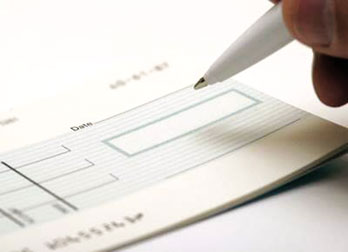Things to consider in cheque operations
S. R. Balachandran
 |
|
S. R.
Balachandran |
Cheques are the popular mode of payment worldwide. If properly
monitored it has several advantages, some of which are as follows:
(1) Large sums of money need not be retained or transported and
thereby losses could be avoided.
(2) An official receipt is not essential for cheque payments, as you
could always obtain a certificate from the payment Bank, if necessary.
(3) Provides better control and internal check within the
organization.
(4) Avoids suppression of information. For eg: In India it is
mandatory that any payment above Rs 50,000 has to be made by cheque.
Crossings on cheques
Cheques drawn as "cash" or in the name of a person without any
crossings (two parallel lines drawn at the corner of the cheque leaf
without obstructing the written instructions), could be encashed at the
counter of the relevant Bank.
However, if the cheque has gone into wrong hands by mistake, the
fraudulent party cannot be identified.
Therefore, it is always advisable to issue crossed cheques which can
be paid only through an account, so that the payment bank will be in a
position to identify the final beneficiary if the necessity arises.
Cheques are crossed in one of the following methods:
(a) Simple crossing - can be paid through any bank account
(b) "Not Negotiable" crossing - - do -
(c) "Account Payee" crossing - paid through the Account of the person
in whose name the cheque has been drawn (drawee)
(d) Restricted "Account Payee" - paid through the specified Bank
Account crossing mentioned on the cheque leaf
In the case of "cash" cheques, if a person "A" steals the cheque from
the drawer - "B" and issues it to a third person "C" in settlement of
dues owing to him, "C" has the right to claim for the amount stated on
the cheque from "B", unless "A" is caught and admits to stealing the
cheque from "B". If the cheque is crossed: "not negotiable" then "C"
loses his right for any claim as he has no better title to the cheque
than "A".
Therefore, utmost care should be exercised when encashing such
cheques presented by unknown persons.
 |
|
It is always advisable to issue
crossed cheques which can be paid only through an account |
Proceeds from a cheque crossed: "A/C payee" can be transferred only
into the account of the drawee or beneficiary. If the name of Bank, A/C
No. etc are stated on the cheque, then payment is restricted only to the
specified Account.
These type of cheques are issued when making payments to the Inland
Revenue Department and Customs Department
Returned cheques
This is the main drawback in accepting cheque payments and the payee
faces many difficulties when cheques presented to his bank are returned.
Cheques are returned with one or more of the following remarks and the
fate has to be determined accordingly:
(i) Payment stopped by drawer Collection is doubtful
(ii) Account closed Funds not adequate in the Account
(iii) Refer to Drawer Do
(iv) Exceeds Arrangement Payment could be collected Funds not
(v) Effects not realised adequate in the Account Collection is
(vi) Not arranged for doubtful
(vii) Payment deferred pending drawer's confirmation Validity of the
cheque has expired
(viii) Stale cheque usually (six months). Payment could be collected
with due certification by
(ix) Alternations on cheque not drawer
Usually accounts maintained verified in trouble areas of the country
(x) Account not verified The payment bank requires thecollection bank
to confirm the (xi)Credit requires banker's authenticity of the drawee.
This confirmation happens for cheques issued byGovernment authorities.
Eg. FPF, ETF Depts.
* Imposed by the Central Bank or Treasury
(xii) Credit Squeeze * By order from a Court of Law or the
Dept. of Inland Revenue
(xiii) Account frozen
Precautions to be taken with regard to cheque operations
1. Cheque leaves/books should always be kept in safe custody
2. Operating mandate together with the list of authorised signatories
should be submitted to the relevant Bank and any changes therein should
be notified immediately.
3. Alternations made on cheques should be specified and authorised.
4. Minimum two signatures should be mandatory for business
organisations. One man operation is not advisable.
5. Bank reconciliation should be done regularly
6. Close scrutiny is necessary with regard to:
a. Deposits not realised for a long period of time
b. Cheques issued not presented for payment
c. Proper bank debit tax charges. Eg: transfer of funds between two
accounts of the same party is exempt from Bank Debit Tax.
7. Bank Debit Tax is being imposed from 1.5.2002 on all payments.
However, exemption has been granted for special payments such as:
Customs duties, Tax payments to the Inland Revenue Department and
Treasury Bills, provided a special account is opened with the approval
of the Inland Revenue Department.
There is a problem faced by the business community when a cheque is
returned by the bank and the customer has not furnished the latest
correct address (innocently or fraudulently), and such customer cannot
be contacted or traced. In such instances the drawers' bank also will
not give the address of its client without his consent.
Suitable amendment have to be made in the law to rectify this
problem, where the bank should provide the clients address when adequate
proof has been submitted for the claim on the cheque returned.
(The writer is Council member of the National Chamber of Commerce of
Sri Lanka)
|



